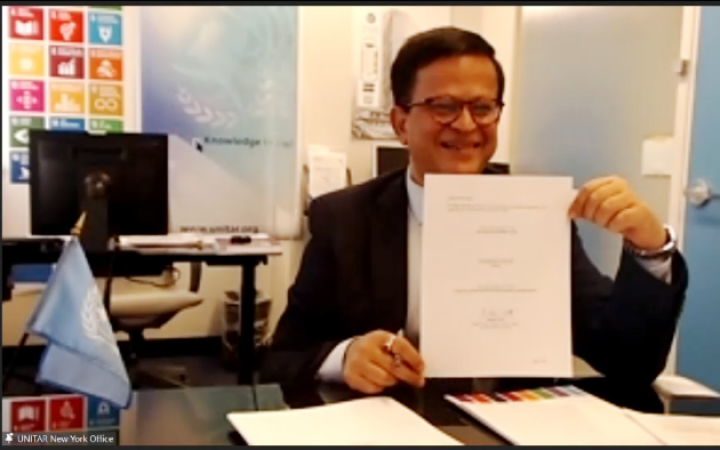26 April 2021, New York, United States of America and Jeddah, Kingdom of Saudi Arabia – The United Nations Institute for Training and Research (UNITAR) and the Islamic Development Bank (IsDB) have signed a Memorandum of Understanding (MoU) and a Joint Action Plan to strengthen cooperation in IsDB member countries.
Both documents were virtually signed by United Nations Assistant Secretary-General and Executive Director of UNITAR, Mr. Nikhil Seth, and IsDB President, Dr. Bandar Hajjar, on 26 April 2021.
The collaboration will enhance national capacities and scale up community level action to screen, detect, and improve care for non-communicable disease (NCD) patients, accelerating IsDB member countries’ progress towards Sustainable Development Goal 3.4 - reducing premature mortalities due to NCDs - by one-third by 2030.
“We are very pleased to sign this MoU and Joint Action Plan with the Islamic Development Bank, which will kickstart a number of strategic initiatives aimed at strengthening capacities in IsDB member countries and contributing to the achievement of the 2030 Agenda through a well-rounded approach,” said Mr. Nikhil Seth during the signing ceremony.
On the occasion, Dr. Hajjar stated: “This collaboration with UNITAR also entails the use of geospatial information technologies and development of early warning systems in our member countries in line with IsDB's Climate Change Action Plan 2020-2025, which promotes climate resilience. We stand ready to support this partnership which aims to enable both institutions to promote knowledge sharing, and develop joint programs.”
Through implementation of the Joint Action Plan, IsDB member countries will benefit from innovative financing solutions, sustainable progress, and improved access to quality, affordable NCD supplies with a particular focus on common cancers affecting women.
IsDB member countries will also benefit from capacity development in disaster risk reduction and the use of geospatial and climate information for improved decision-making. This will include the provision of rapid mapping services, including rapid satellite imagery analysis, to improve situational awareness and support relief and response efforts and recovery efforts in an emergency context. The collaboration will also support the development of new and improved flood and drought early warning systems to improve climate resilience in IsDB member states.
Furthermore, IsDB’s effectiveness in its development-based interactions with member countries will be enhanced through the provision of training on core diplomatic skills such as negotiation, leadership in crisis and conference diplomacy, among others.
UNITAR and IsDB will also cooperate in the field of chemical and waste management, with a focus on improved classification and labelling of chemicals, enhanced waste management systems, and more accurate registries of emissions and releases.
For more information, please contact
Islamic Development Bank
Mansur Muhtar, Acting Chief Product and Partnership Officer (CPO) Directorate
Email: mmuhatar@isdb.org
United Nations Institute for Training and Research
The Defeat-NCD Partnership
Mukul Bhola, Chief Executive Officer, The Defeat-NCD Partnership
Email: mukul.bhola@defeat-ncd.org
Operational Satellite Applications Programme (UNOSAT)
Einar Bjørgo, Director, Division for Satellite Analysis and Applied Research, UNITAR
Email: einar.bjorgo@unitar.org
Multilateral Diplomacy Programme
Rabih El Haddad, Director, Division for Multilateral Diplomacy
Email: rabih.haddad@unitar.org
About the Islamic Development Bank
Rated AAA by the major credit rating agencies of the world, the Islamic Development Bank (IsDB) is an MDB that, for the past 46 years, has been working to improve the lives of the communities it serves by delivering impact at scale. The Bank brings together 57-member countries across four continents, touching the lives of almost 1 in every 5 of the world’s population. With Science, Technology, and Innovation as the core driver of its mandate, IsDB's mission is to equip people to drive their own economic and social progress at scale, putting the infrastructure in place to enable them to fulfil their potential (https://www.isdb.org).
About the United Nations Institute for Training and Research
The United Nations Institute for Training and Research (UNITAR) is a principal training arm of the United Nations, working in every region of the world. We empower individuals, governments and organizations through knowledge and learning to effectively overcome contemporary global challenges. UNITAR was established in 1965 as an autonomous body within the United Nations with the mandate of enhancing the effectiveness of the work of the United Nations and its Member States. In 2019 UNITAR’s reach extended to more than 130,000 beneficiaries through face-to-face seminars and workshops, e-learning or other training-related events. (http://www.unitar.org).
The Defeat-NCD Partnership
The Defeat-NCD Partnership is a practical response to the widespread call for action on NCDs. Formally launched alongside the UN General Assembly in 2018, we are a ‘public-private-people’ partnership anchored in the United Nations but extending well beyond to include governments, multilateral agencies, civil society, academia, philanthropies, and the private sector.
Our vision is clear — universal health coverage for NCDs. To achieve this, our core mission focuses on assisting approximately 90 low-resource countries via comprehensive action across four interconnected service pillars: national NCD capacity building, community scale-up of NCD services, affordability and accessibility of essential NCD supplies, and sustainable NCD financing.
Fifteen million people die prematurely every year from non-communicable diseases like cardiovascular disease, chronic respiratory disease, diabetes and cancer. In 2016, non-communicable diseases were responsible for 41 million of the world’s 57 million deaths (71%). The burden is greatest within low- and middle-income countries, where 78% of all non-communicable disease deaths, and 85% of premature deaths, occurred. (http://www.defeat-ncd.org/)
Operational Satellite Applications Programme (UNOSAT)
UNOSAT is a technology-intensive programme delivering imagery analysis and satellite solutions to relief and development organizations within and outside the UN system to help make a difference in critical areas such as humanitarian relief, human security, strategic territorial and development planning. UNOSAT develops applied research solutions keeping in sight the needs of the beneficiaries at the end of the process. (http://www.unitar.org/unosat/)
Multilateral Diplomacy Programme
The Division for Multilateral Diplomacy works to enhance the capacities of diplomats, public officials, delegates, students, professionals and other stakeholders to increase performance in conferences and meetings convened at the United Nations as well as other international and regional organizations, and level the playing field in multilateral settings. We are uniquely positioned to support countries in strengthening national institutions for building capacity at all levels and fostering the participation of Member States in global governance, contributing to the acceleration of the 2030 Agenda. (http://www.negotiation.unitar.org/)



